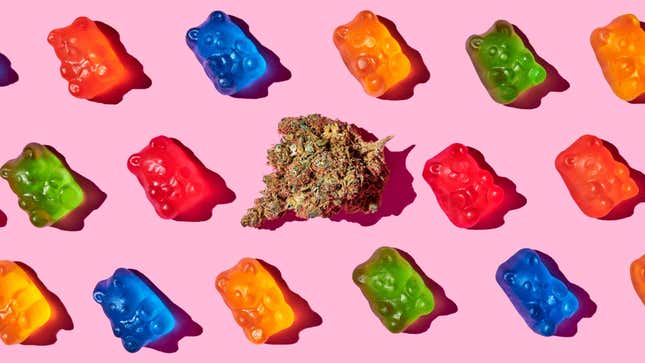
The packaging of any given cannabis-derived product will tell you a lot about what it’s supposedly good for—helping you relax and fall asleep, or taking the edge off of your anxiety, or pain relief, for example. But these are little more than generalizations. We genuinely know so little about the cannabis plant that efforts to define and codify what any given cannabinoid does are basically summarizing initial research and accepting it as a final conclusion.
While CBD has long been a superstar cannabinoid alongside THC, in recent years we’ve entered a whole new world of weed possibilities as increasing legalization has encouraged the industry to expand—isolating, analyzing, and conducting studies involving each of cannabis’ many unique compounds, including delta-8, delta-10 and THC-O. One of the latest to draw attention is CBN, which is often promoted as a reliable sleep aid when included in a cannabis product like a gummy.
CBN was first isolated from cannabis oil in the late 19th century, according to a report in the British Journal of Pharmacology. Since, it has developed a reputation as the “old weed” cannabinoid that results when THC has been degraded by heat, light exposure, and time—why, if you smoke an ancient nug that has been sitting in a drawer for years, you will still feel something, but it may be less of the clear-headed high you are used to from fresh, THC-rich flower.
In the rush to bring new products to market, brands are promoting CBN as a natural, plant-derived additive that can make you feel more relaxed—a sort of halfway point between THC and CBD. But what’s actually behind those claims?
Some companies are already working with CBN
Dosist Co-Founder Jason DeLand is one of the brands creating CBN-containing products, which, he told Lifehacker, puts them in exclusive company. “CBN is more scarce and expensive to procure, which means fewer companies will be able to offer it,” he said. “Dosist is one of the early pioneers to have isolated CBN and incorporated it into our products.”
Isolated CBN isn’t available in consumer markets; it is, as DaLand noted, typically combined with other cannabinoids to create marketable products. Project CBD, a cannabis education website, notes that CBN by itself won’t have an intoxicating effect. “Consuming CBN isolate may weakly stimulate your ECS [endocannabinoid system], and this conceivably could help some facets of sleep,” Project CBD notes. “However, mechanistically this should not be any different than taking a very low dose of THC.”
“Neither CBD nor CBN produces an intoxicating high on their own, but they both affect the high when combined with THC,” DeLand said. “The presence of CBD tones down some of the negative effects of THC, like paranoia or anxiety, while the presence of CBN produces a gently sedative high that has shown to be beneficial for people wanting to use cannabis for better sleep.”
Admittedly, the evidence to back up this claim is less than scientific. DeLand said that while Dosist customers have shared that the company’s CBN-containing gummies improve their sleep, “CBN studies are still underway.”
The research on CBN is lacking
Not all brands are sold on the merits of CBN as an additive. While CV Science’s +PlusCBD brand creates a product aimed at helping their customers fall asleep faster, they have yet to incorporate CBN into anything they produce. The company’s medical advisor, Dr. Michael Lewis, MD, noted the risks associated with experimenting with new cannabinoids you may not have previously experienced.
“[The company has] not yet produced a CBN product due to the lack of published research,” Lewis said. “When additional peer-reviewed studies become available, the company could potentially develop a product that leverages CBN’s unique effects.”
The caution is due to a lack of scientific consensus. “Clinical research on CBN and its effects is still an emerging field compared to other cannabinoids,” Lewis said. “It is essential to review a brand’s claims before selecting a product. Preliminary research shows it to be a highly promising cannabinoid with a variety of uses. Still, further research is required to raise CBN to the same level as other major cannabinoids, like THC or CBD.”
CV Sciences’ +PlusCBD sleep gummies, Lewis noted, include sleep-aid ingredients that have been clinically studied, including melatonin and magnolia bark.
All weed can make you sleepy
For the weed-sensitive, a low tolerance for any cannabinoids will render cannabis a sleep aid if you’re not careful. The hundreds of other substances in any given flower—including flavonoids, terpenes, lipids, and other phytochemicals—will affect your experience, as will your body’s particular constitution and other substances you may have consumed, like caffeine and alcohol. Cannabis is a reliable sleep aid for many, but it isn’t typically something to throw at a random sleepless night like a cure-all.
More on CBD from G/O Media’s partner.
Lifehacker is not involved in creating these articles but may receive a commission from purchases through its content:
The Top 10 CBD Oils (and Why)
Evaluating the Most Impressive CBD Gummies
Do CBD Products Really Relax You?
